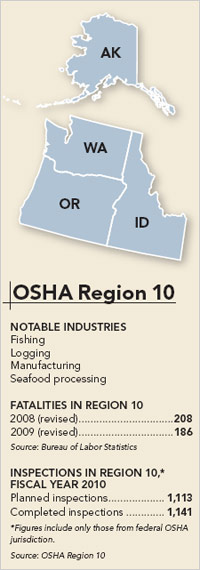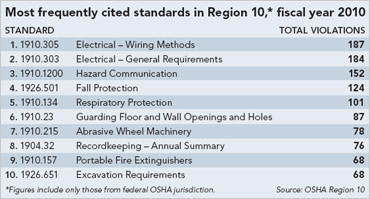Going the distance
OSHA Region 10 meets goals despite limited jurisdiction, language barriers
By Ashley Johnson, associate editor
With three states that administer their own occupational safety and health program (Alaska, Oregon and Washington), OSHA’s Region 10 recognizes the importance of monitoring State Plans.
“We try to keep a handle on what the states are doing and making sure they’re effective,” said Regional Administrator Dean Ikeda.
That comes relatively easy with Washington and Oregon, two states Ikeda praised for being independent and proactive. Monitoring Alaska requires sending inspectors into frigid temperatures and remote villages, while in Idaho – the lone state completely under federal OSHA jurisdiction – Region 10 partners with private industry to advance safety.
Targeting risky industries
Region 10 completed 1,141 inspections – 28 more than planned – in fiscal year 2010. Ikeda attributed this success to being productive and having a good management team.
“We keep track of our annual goals by providing reports every week to our field managers on how they’re doing against the operating plan that we have in place. So, they know from week to week whether they’re falling behind or they’re ahead, and I think that helps,” he said.
Water-related industries are a major focus of Region 10, given that three of its states border the Pacific Ocean. The agency’s jurisdiction, however, extends only three miles offshore.
Regarding Local Emphasis Programs, Ikeda said the office in Anchorage, AK, targets floating seafood processing operations because of the industry’s historically high rates of lost-workday injuries. The shipyard industry in Alaska, Oregon and Washington also receives heavy scrutiny every year.
Federal agencies such as U.S. Customs and Border Protection fall under the responsibility of Region 10, which runs an LEP focused on federal agencies with high numbers of workers’ compensation claims. Other LEPs address offshore oil and gas well drilling platforms in Alaska and logging in the other three states.
Successes, barriers
Ikeda noted that many language and cultural issues exist because of the region’s diverse workforce. In the field, inspectors sometimes use a translation service that provides an interpreter over the phone. “It would be nice to have a compliance officer who is fluent in Spanish in each of our offices, but we don’t,” Ikeda said.
Additionally, Region 10 is home to many Native American tribes. Some tribes have issued complaints about hazardous conditions in casinos related to activities such as carpentry, motor vehicle maintenance and landscaping. Region 10 covers the majority of tribal reservations in Oregon and Washington, but the agency is limited to a single tribe in a fairly remote area of Alaska, Ikeda said. Reservations in Idaho fall under federal OSHA.
Alaska’s temperature and geography pose a challenge for Region 10. Ikeda said inspectors receive cold-weather gear to protect them from the sometimes harsh climate. Alaska is the largest state in the country, but also sparsely populated and has many remote areas. As a result, Region 10 charters boats, planes and helicopters to transport inspectors to some parts of the state.
‘Self-sufficient’ State Plans
Ikeda described Washington and Oregon as independent, as both provide a lot of their own in-house training.
“Washington and Oregon are relatively large State Plans and so they tend to be pretty self-sufficient and proactive, and they make use of their public affairs people and publicize significant cases when they can,” Ikeda said. “There are not many issues that come up that need our assistance in either of those states.”
To keep track of State Plan states, Region 10 meets with each one at least quarterly to evaluate performance against goals and address any problems. If necessary, Region 10 schedules special studies to address a particular issue.
Post a comment to this article
Safety+Health welcomes comments that promote respectful dialogue. Please stay on topic. Comments that contain personal attacks, profanity or abusive language – or those aggressively promoting products or services – will be removed. We reserve the right to determine which comments violate our comment policy. (Anonymous comments are welcome; merely skip the “name” field in the comment box. An email address is required but will not be included with your comment.)

